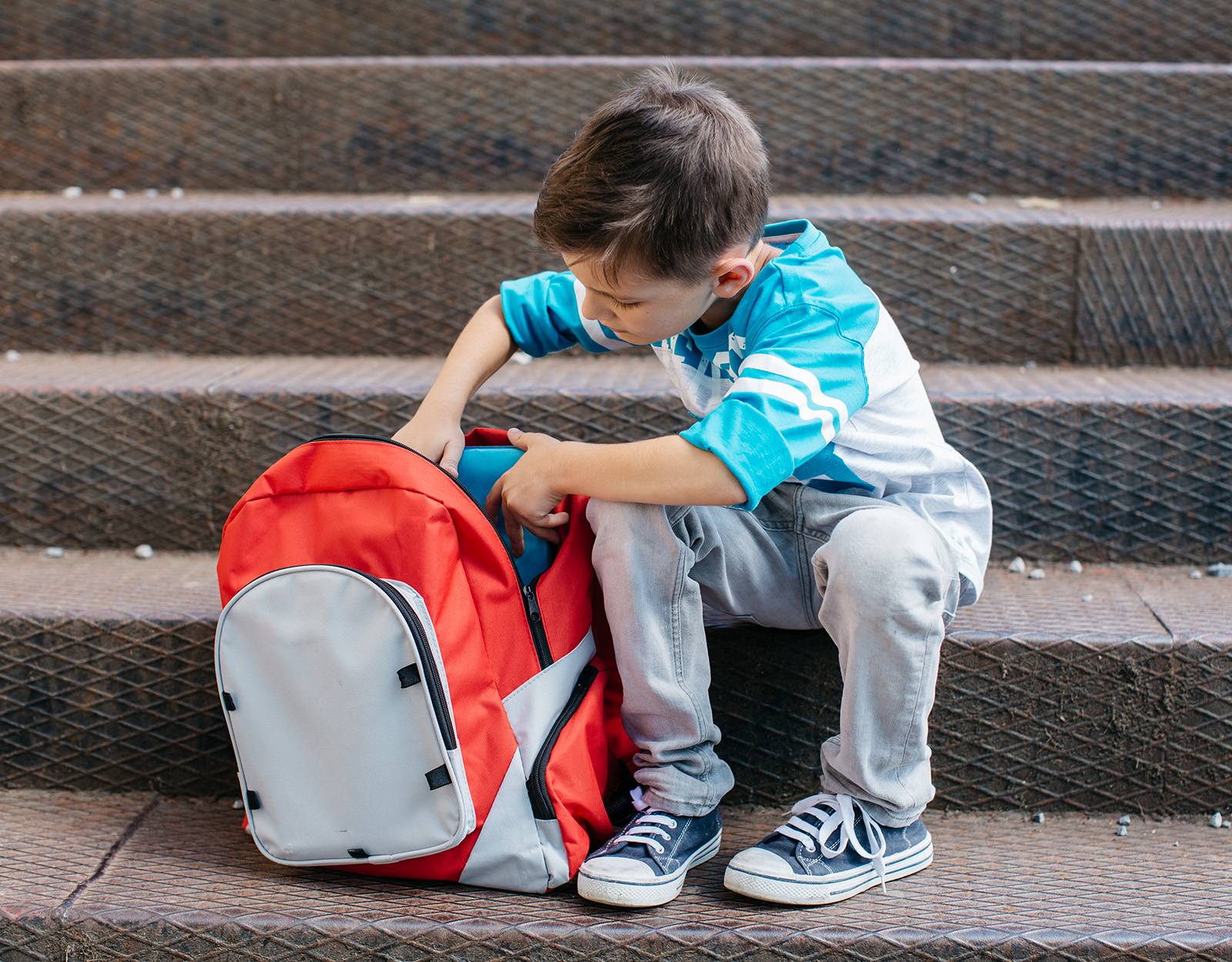Table of Contents
Following a long summer filled with your child sleeping all day or doing things on his schedule, the first day of school may be an unpleasant awakening.
Whether your child is a first-time student or has been going to school for years, ‘back to school’ always marks a period of change. He gets new teachers and subjects, a new schedule, and a new social scene.
Here are some ideas to help your child transition seamlessly from summer to school:

First Day of School Jitters: How to Deal
Your child’s first school day may be a whirlwind of events and emotions. If your child is new to his school, he may not know where to go. His locker may not open because of his nervousness, or he may have forgotten his medical documents at home.
Here are some tips to help your child do away with that anxiety and nervousness during a period of change—the first day of school.
1. Tour the school.
How can you help your child? If your child is new to the school, visit the campus with them beforehand. That way, you can help your child navigate around. Consider getting a school map. Keep the map in your child’s backpack at all times so he doesn’t get lost.
2. Help your child pack his things.
Because of your child’s nervousness or excitement, he may accidentally forget to bring the necessary materials to school. Help your child pack the night before the first day to avoid a last-minute rush. Bring papers, school supplies, books, and other paperwork needed.
You may also include your child’s latest immunization records, class schedules, permission slips, and other documents, among other things, to pack in his school bag.
3. Choose clothes beforehand.
Prepare your child’s outfit beforehand as well. Your kid may want to wear something nice and new because it’s his first day of school. So be sure to involve your child in choosing his clothes.
Also, if your child has a new pair of shoes, let him wear them a few days before school starts to know if he will feel comfortable and whether his feet will ache or not.
4. Let your child know what to expect.
There may be an opening-day ceremony to welcome the new school year. Some schools have a homeroom assembly. But for others, they go straight to class. Ask the school about their activities so you can prepare your child beforehand.
Tell your child that the first day of school is when he’ll meet his new teachers and classmates. Each teacher will tell the class what the subject is about and what he’ll be learning. There may also be a ‘get-to-know-you’ portion during class.

5. Manage your child’s emotions and social life.
Tell your child it’s fine to be thrilled, nervous, or afraid to go to school. But it’s also not a scary thing. If your child is the quiet type, encourage him to start small. Huge gatherings or crowds may keep your child in an uneasy or nervous state.
Let him get to know one to two of his classmates per day. Also, suggest ideas on who he can talk to, like his seatmate. Tell your child to invite these new friends as well, whether to be your child’s lunch buddy or an activity outside school.
If you notice that your child is still uncomfortable, even after a long time since school started, you can let him talk to the guidance counselor, his teacher, or any school staff he can trust.
6. Choose the right food.
Food can greatly affect your child’s mood and energy throughout the school day. When packing food for your child, go for healthy food. Don’t go for cheeseburgers, pizza, or tacos!
Consider foods that you know will keep your child active and engaged all day while still getting the proper nutrients for growth and development.

Stressed with School? How to Not!
Your child may easily be stressed in school, especially when there’s a lot of schoolwork to do. Balance is the solution. Here are some stress-coping strategies you can help instill in your child.
- Let your child make the most of his time in the classroom.
Tell your child to be attentive during class lectures. That’s because if your child understands the topic well, he won’t have to reread, relearn, or study the material for so long at home.
- Tell him to take notes on his class lessons.
Making notes during class can help sustain the information in your child’s brain. Tell him how taking notes can be beneficial. He will have a good memory while writing down a specific concept.
The habit of taking notes will help your child remember or recall information when taking quizzes or reviewing materials at a later date.
- Provide your child with a planner.
A planner, a notebook, or a personal calendar can help your child strategize his days and times. He can note when his examinations are, so he knows when to prepare for them. With a planner, your child learns to be organized in time management.
Things to write in the child’s planner will be his other schedules, including soccer practice, hangouts, and club meetings and activities, so he can manage his time more effectively. Doctor’s appointments can also be included.
- Try not to let your child lag behind.
One important thing you must let your child realize is that cramming is never good. Instill it at a very young age, so he won’t suffer the consequences. If your child has a failing mark in his subjects, you may want to ask for assistance.
Talk to your child’s teacher, particularly the subject teacher, or the school’s guidance counselor, so early intervention can be done. They may give you suggestions, like sticking to a study schedule at home or getting a tutor for reinforcement after school.
What Should I Do If My Child Is Sick and Can’t Go to School?
Everyone gets sick at some point, and your child is no exception. If your child gets sick during a school day, it’s fine. Depending on his condition, he can be absent for a day or two. Here are some helpful guides to ensure your child won’t fall behind in his academics:
Ask Around
Ask your child’s friends to update you or your child about new lessons. Get a copy of their notes if there are worksheets and assignments given. Take time to collect these materials so your child can study and work on them at home.
If your child is still sick the next day, you can bring the written assignments to the school and submit them to your child’s friends or teachers. When your child returns to school, let him ask if he can make up for the time lost and/or take the missed examinations and schoolwork.
Build a Good Relationship with Your Child’s Teachers
Talking to his teacher personally if your child is sick could be advantageous. Show the teacher how much you care for your child and ask for help. They can assist your child in catching up on the schoolwork he missed.
Tips for a Well-Rounded School Life for Your Child
To prepare your child for school, here are some tips for a balanced and well-rounded academic life:
1. Start with a nutritious breakfast.
As the saying goes, breakfast is the most important meal of the day.’ This is true, especially for children with a long day ahead. Students who eat a nutritious breakfast often do better in class.
2. Let your child participate in extracurricular activities.
The school could be a source of burnout for many students. Let your child participate in extra-curricular activities such as clubs, sports, theater, or other activities to balance out their life. Additionally, these let your child meet new friends.
3. Make your child do less schoolwork at home.
If your child works more at school, he will have less to do at home. Tell your child to use his free time throughout the school day to review notes, visit the computer lab or library, get a head start on assignments or research that huge term paper.
Aside from that, your child can also listen attentively in class and understand the topics well, so he’ll spend less time doing homework or studying.

4. Ensure your child gets the right amount of sleep.
Your child needs adequate rest to function and concentrate properly. At least eight and a half hours of sleep are required. If there’s an exam the next day, don’t let your child stay up all night.
Studies show that those who got enough sleep performed in math tests three times better than those who stayed up all night.
5. Offer support.
Your child may be having a hard time in school. If they aren’t telling you or if you feel like they’re already stressed out of school, offer some support. Tell them you’re there to help them if they need anything.
If you feel they’re facing mental health problems, consult the school counselor. You can also let your child’s pediatrician refer you to a psychologist. We at Omega Pediatrics believe that mental issues shouldn’t be ignored.
Get Your Child Ready For School
School allows your child to learn, meet new people, and participate in new activities. Let your children be prepared for school and transition from summer to school seamlessly, so they won’t find going back to school a daunting experience.
Your provider at Omega Pediatrics is happy to help you and your child get ready and cope with academic life. We treat our young patients holistically, ensuring their overall health as they navigate through their childhood years.
FAQ
How can I help my child overcome first-day jitters?
Ease your child’s anxiety by touring the school together beforehand, helping them pack essential items the night before, choosing their outfit in advance, informing them of what to expect on the first day, and encouraging them to manage their emotions and social interactions gradually.
What strategies can I teach my child to cope with stress at school?
Teach your child to make the most of classroom time by being attentive and taking notes, provide them with a planner to organize their schedule, encourage them to seek help if they fall behind, and emphasize the importance of avoiding cramming and seeking assistance when needed.
What should I do if my child is sick and unable to attend school?
Stay proactive by asking friends for updates on missed lessons, collecting assignments and notes from classmates or teachers, communicating with teachers about your child’s absence, and ensuring your child catches up on missed work once they’re well.
How can I ensure a well-rounded school life for my child?
Start the day with a nutritious breakfast, encourage participation in extracurricular activities, aim for less homework by utilizing school time effectively, prioritize adequate sleep, and offer support to address any challenges your child may face.
How can I prepare my child for a seamless transition from summer to school?
Prepare your child by familiarizing them with the school environment, assisting with packing essential items, discussing what to expect on the first day, managing emotions and social interactions, and ensuring they have the necessary support to navigate academic life effectively.



